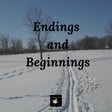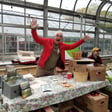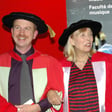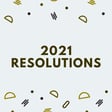Become a Creator today!Start creating today - Share your story with the world!
Start for free
00:00:00
00:00:01

Reid Allaway and Tourne-sol's elec-truck project
I spoke to project head Reid Allaway about organic vegetable and seed farm cooperative Tourne-sol's operations, protecting farmland as a commons and how they went about getting a fully electric truck.
Transcript
Introduction and Co-operative Turzal
00:00:02
Speaker
My name is Tracey Ariel and I am an apologetically Canadian. This week we're speaking with Reid Alaway. He is one of the co-owners of Co-operative Turzal, which is a, what would you call it? I guess, I mean, it's a farming cooperative, but it's a workers co-op is the legal structure. And so it's a co-op that,
00:00:30
Speaker
The idea of a workers co-op is that it exists to fulfill whatever mission you give it, but in providing good jobs for the worker members. And so when we were starting our farm, we looked at various business ownership and management models and we wanted to all be on an equal footing and have a democratic decision-making structure.
00:00:55
Speaker
So it gravitated towards co-ops and among the various types of co-op structures, the one that suited our purposes the best or seemed to was a workers cooperative.
Co-op Structures and Decision-Making
00:01:05
Speaker
And at that point, there weren't any workers cooperatives directly engaged in agricultural production, but it has fit us well enough that we've had a number of other Quebec farms follow our lead. And now I think we must be
00:01:22
Speaker
there must be like 15 vegetable farming businesses similar to ours that are registered as workers cooperatives. Right. And can you, um, it's interesting because, um, I helped co-found an, um, an agricultural urban agriculture co-op here in Verdun, but we've gone to a nonprofit, um, nonprofit solidarity model because we found, cause we were doing farmers markets. And so we found that the,
00:01:49
Speaker
non-profit structure work best for what we were trying to do and for what we were actually achieving because the workers co-op is supposed to be good jobs for members and it wasn't very good jobs for members. It really is a community project in this case. For us from the very outset there were five of us starting the farm and our intention was for all five of us to work at it full-time so having the sort of
00:02:17
Speaker
gainful quality employment as central to the mission was very logical and key and universally agreed upon as being crucial. And because it was five people giving virtually all of their time to it, the idea of extending the decision making structure to the broader public of the
00:02:43
Speaker
to have a wider membership like a solidarity co-op would have, which you could totally do with the CSA farm. But you might have to be more open-minded than we were where we felt like the idea of sharing decision-making while all of the risk and workload was being born by the five of us didn't interest us. And so we wanted to keep the decision-making limited to a smaller membership
00:03:13
Speaker
Um, we still call our CSA members members and they are members of our CSA weekly vegetable basket program. And they are absolutely integral to the proper functioning of our farms marketing and thus of our farm, but they don't have any, um, any defined decision making power, uh, in terms of how the farm is managed and what we do with
Growth and Community Involvement
00:03:40
Speaker
it.
00:03:40
Speaker
Well, and someone with a CSA basket probably doesn't need that anyway. I mean, they're not really interested in the annual general meeting and all that kind of stuff usually. Yeah, normally they want to do the 400 other hours of meetings that would be necessary to grasp what's going on and make informed decisions. Yeah, exactly. The five of us who are now actually seven, as we've had two of our long-term
00:04:05
Speaker
employees join the co-op as full members and we're looking to continue that progression over time and have it become a more of a fluid continuum like a larger co-op would experience over time where the founders are gradually joined by others and the founders contribution can diminish and dilute. And through that process over 20, 30 years, I think that's our greatest chance of
00:04:33
Speaker
of making something stable that outlives us and continues to feed local families and provide good jobs in farming here. Yeah, because your land, where is your land actually? We are right at the intersection of all of the major transit routes in Eastern Canada, Highway 20, Highway 40, Highway 30, CN and CP rail, all of these items run within five kilometres of our farm. So keeping it in farmland for the next three generations will be
00:05:03
Speaker
an issue. The pressure of peri-urban development in this region, which is some of the best remaining farmland in all of Quebec, is going to be astonishing. And we're better equipped in Quebec than people are elsewhere in Canada where the legal protection of farmland is really strong. But we also believe that having 500 families directly involved in
00:05:33
Speaker
benefiting from a farm is probably an even stronger protection for the vocation of this land than any legislation that can be deemed irrelevant when, you know, so-called development. Yeah, it can be a challenge land. It can be a challenge keeping farm in a family, let alone in a
00:05:58
Speaker
You know, with a group. Now you said 500 farmers. Are you actually supplying baskets to 500 families? 720, I think is the actual CSA membership presently. And that includes people who take shares every two weeks, but every week we're doing 500 shares. Wow. And so there are 720 odd CSA member families.
00:06:19
Speaker
and we've stopped going to market. We reoriented all of our efforts to the CSA exclusively, but in tandem with the vegetable production, which is now all CSA, we have a growing and very successful organic seed enterprise that operates on the farm and produces and contracts and also buys and resells organic seed pretty much across Canada at this point.
00:06:46
Speaker
Yeah, well, and I know because we've bought quite a lot of your seed, actually. We're very happy with that part of your operation. Yeah, and that's been really fun. It's given us a chance to diversify our sphere of influence. Seed production has been a passion of Dan's since we were undergrads. And it's also drawn a lot of people to our farm.
00:07:07
Speaker
who might not have been interested in visiting or working at just a vegetable CSA, but for whom the seed production and marketing aspect is really interesting.
00:07:18
Speaker
And it's also allowed us to create, to help to foster a, another sub-economy where some of our past employees have chosen to go into seed production to avoid having to do all the marketing of CSA. And like Marie-Claude Como is now running a seed farm and we're her main buyer. Wow. So,
00:07:42
Speaker
We're helping to help other small Quebec seed growers to have a market for their products so that they don't have to start a seed company. They can just sell it all in bulk to us.
Land Ownership and Stewardship
00:07:56
Speaker
Right. And how much land are you operating for that kind of a product? We are on five acres, sorry, five hectares owned and two more hectares rented. And we were renting everything until about
00:08:12
Speaker
Three years ago, we severed and purchased the lot, kind of the logical space between the main road and the first drainage ditch. And we're still cultivating a bit of area across the ditch, rented from our friends, neighbors, and mentors of Le Femme L'Entre, which is also Le Moulin des Sedres and the Duavrin family. And we're here because they offered to rent us land back in 2004.
00:08:41
Speaker
And even though it wasn't really to their advantage, they also agreed to sever and sell us the land that we're operating on in 2018 maybe that we did that. Oh, relatively recently then. Yeah. Well, we didn't have a lot of incentives to assume all that debt. We were pretty happy paying rent to our neighbors and friends rather than paying mortgage to the bank. But for the long term,
00:09:10
Speaker
health of the co-op, it made sense to acquire the land before it tripled in value again, which seemed to be the way it was going. And we were able to do it. We were able to convince the financier. It was certainly easier to convince the, or not the financier, but the CPTQ, the Commission for the Protection Study for Regricual. They have to agree to any locked division on agricultural land.
00:09:39
Speaker
and you have to have a really strong case if you want them to break up a larger lot into two smaller lots. And typically they don't want to create small lots because they create, they kind of shred the edges of farmland by creating lots that people can buy just as a hobby farm or a suburban home with a bunch of hay, you know, a big yard.
00:10:08
Speaker
But given that we had been supporting six or seven families for more than a decade, they had a hard time arguing that the lot was too small to support a farming enterprise. The predecessor to urban agriculture, actually. Yeah. That was an important hurdle or chapter in the history of the co-op. Now, if we can manage it properly,
00:10:35
Speaker
It should eliminate the big hurdle that typically comes with a generational transition where all of the equity of the founders or owners is tied up in the land and the land has to be sold at or close to market value in order for those people to retire.
00:10:55
Speaker
We're trying to sidestep that by not having any equity personally in the business and that the farm really belongs to itself and we're just stewards. That's a smart way to go about it, but it can't be easy. No, the big challenge is making enough money at it that we can pay ourselves adequate wages so that we can, by living simply and being careful, we can put aside money for our retirement
Managing a Workers' Cooperative
00:11:25
Speaker
from our wages rather than depending on the land sale for our retire for retirement savings.
00:11:33
Speaker
Right and so well in many ways you're breaking ground in that area too because there's not a lot of co-ops. I mean I don't, I mean the co-op model by itself we should mention before we even start is actually pretty hard all by itself. I mean when we started this we were a little idealistic about it and there's many, when we actually turned into a non-profit
00:11:57
Speaker
solidarity co-op, we did consider just going with the non-profit route because it would have been easier. Our values, we decided it was more important to have co-ownership and basically the cooperative values were important to us. We didn't do it for any ease of, I mean, it's actually much harder to run a co-op than it is to run an OB&L.
00:12:22
Speaker
Yeah, you can't just empower a board or an executive director to manage things. And the provisions for democratic governance are very real. And they are slower and more cumbersome than someone dictating what's the way to go. But they also result in higher long-term success rates because everyone involved has had to
00:12:51
Speaker
Compromise quite a lot along the way And you don't get anything if you leave except you leave so you can leave your frustrations and your your compromises behind and the co-op will Bid you farewell and reimburse your initial shares which have a trivial value by the end of a certain amount of time and or sometimes shares that you've accrued as dividends in
00:13:20
Speaker
in good years, but ultimately, if any one of us chooses to leave the farm, the farm would owe us a certain amount of money that is long-term debt, but not a whole lot. So there's a real disincentive for myself and my wife to quit this farm and try to start another farm would be, just fills us with absolute horror.
00:13:49
Speaker
We're easily like way too old for that and we're 43 and 44. Not old at all. But it does like even with 25 years of farming ahead of us, there's no chance that we're never going to give up. We'll compromise on anything and we'll work through any differences of opinion that we have with our fellow co-op members because the prospect of giving up on it and walking away with
00:14:18
Speaker
not with nothing, but with minimal means to start over would be. Also having lived through all of the great benefits that a co-op provides of flexibility of schedules and management at such a high level of efficiency with seven brains operating the machine that the idea of going back to it
00:14:44
Speaker
a single director or a couple-based business would just be terrifying. Well, can you talk a little bit about some of the biggest successes you've had? Because one of the benefits that you do have, especially with the way you're going, is that your legacy will be this farm that will continue after you're finished, which is, in a farming community, actually a big deal now. There are so many farms that
00:15:11
Speaker
you know, family farms that are going for generations and have had to sell out to other people because they, and people that don't even keep their values, but they just needed to retire. I mean, that's happening in Quebec all over. And so you don't have to face that at least, that's a big deal. Yeah, nor do we have to raise our kids in an environment where that kind of immense pressure hangs in the background all the time. I really couldn't care less if our kids
00:15:40
Speaker
get involved in farming, we honestly can just say, you're free to do whatever you want. If you want a job on the farm, well, yeah, we'd love to have you. Why don't you harvest the asparagus on Saturday and we'll pay you. And they're like, that sounds like work that yeah, I'll pay you. That is work. It's a job. You don't do it. We're paying someone else to do it. If you want to do it, then you can do it. But the
00:16:07
Speaker
the future of the farm is not dependent on them developing an interest in this particular mission. The farm continues to attract new, energetic, brilliant, and wonderful people every year. And some of them will be happy to carry it on. And our goal right now is to, even when we're hiring people,
00:16:31
Speaker
when Emily and Renee are interviewing folks, meeting them for the first time to talk about a single season employment opportunity. They're actually also sizing them up. Do we think this might be someone, you know, where does she live? Is her partner in the region? Is it possible that they would actually settle here and that she might stick with the farm in perpetuity? These are now perspectives that we have when we're
00:17:01
Speaker
And when we're enjoying getting to know our new employees for the first time, we're already trying to plant the seeds of, hey, you know, if you come back next year, we'll teach you bed prep. And if you want to learn the pest and disease scouting with Renee, that's a second year job. And so we're, we're really trying to groom people and make it clear to them that there could be a long-term future here for them. And with that approach, I really have no,
00:17:30
Speaker
anxiety at all about the long-term future of the farm with a big community support base of hundreds of eaters who are really motivated if the farm ever needs help or understanding or to be defended on the public stage because of a development happening like we've got a big support there. And because we're so many managers, we're widely involved in
00:18:00
Speaker
all sorts of different spheres in the agricultural economy here in Quebec from, you know, if there's a seed group, Dan is involved. If there's something about green manures, I'm involved. We are kind of constantly visible and as such loads of potential future farmers hear about our farm when they're in stashes or when they're in school and then they apply and work here and
Electric Vehicle Conversion Project
00:18:31
Speaker
Like I think we're doing a good job on that level of making sure that we do everything right or as much as possible to have the farm succeed and thrive well beyond what the five of us can actually do for it. So that's very exciting.
00:18:49
Speaker
Yeah. Well, and one of the things that I noticed in one, the why I reached out with you was your recent crowdfunding campaign where you actually bought a, you bought a truck that is going to be, I mean, that's a, what is it called? I mean, it's not a, you're converting a diesel truck to electric, right? So yeah, we've been looking, we've needed, we're a co-op, so it takes us about three years to buy a vehicle because the decision making process is that challenging and because
00:19:19
Speaker
there's nothing great available on the market. And I started tinkering with electric vehicles.
00:19:25
Speaker
for our farm smaller scale tools about four years ago through personal interest and a couple of chance meetings with people who are already really good at this and who generously helped me. The do it yourself electric vehicle crowd has the same insane level of mutual assistance that organic farmers do where you'd be like,
00:19:52
Speaker
Hey, I know you've never met me, but do you want to mail me that part? Yeah, sure. No problem. Here's how you use it. Or do you want to meet me in a parking lot in Verdun and I'll trade you batteries for a controller? Yeah, sure. Just feed my kids and I'll meet you there in half an hour. So it's been really fun. It's technical work that I really like and that I'm able to pursue again, because we're so many managers, each of us can
00:20:22
Speaker
can kind of have a bit more flexibility to pursue interests and projects that we probably wouldn't have the flex in our schedule to get good at if we were trying to wear the 700 hats that a husband and wife have to wear in order to run a farm. We only have to wear a couple dozen hats each because there are so many of us. And so you can even pick up an extra hat and be like, oh, I want to learn this hat.
00:20:52
Speaker
And so you were successful. I mean, you raised $5,000. In a qualified fashion, the Electra campaign has been a massive qualified success in that the response to the request that we put out to our community was heard loud and clear. People got really excited about the prospect of
00:21:15
Speaker
a farm like ours being able to switch to fully electric delivery vehicle long before the big three or even the Europeans or Chinese
00:21:28
Speaker
Before anyone can actually sell me, sell us an electric truck, we're going to actually get out in front and demonstrate that it's possible by partnering with a conversion company that is another little Quebec success story. Well, bigger than us by many forms of reckoning, but they're really great. And I approached them. They have a conversion package for Ford trucks.
00:21:58
Speaker
I didn't think that they were going to be interested in doing a one-off for a little farm. It's not really helpful to them. They convert fleets of buses and they're doing all of Videotron's service vans. They have work coming out their ears. They have clients lining up around the block.
00:22:20
Speaker
The only reason I could see them doing it was if they thought it was a cool project. So I prepared a presentation and went and met them in person and pitched them on it. And Andy was like,
00:22:33
Speaker
Totally. We're in. We didn't get into building electric vehicles because we have no ideals. This is really exciting. We would much rather do one truck for you than another school bus that goes to California. So we'll tuck it into the assembly roster somewhere. I don't know where we're going to fit you in, but we're going to make it happen.
00:22:56
Speaker
And then they advise me on truck specifics for the best possible fit with their drive train and batteries. And we chose a larger truck than what we currently have so that it'll be a big improvement. And really from an ecological and net environmental impact perspective, I love working with these guys because
00:23:25
Speaker
They are not trying to build a brand new truck. They are saying, bring us a Ford cadaver. Bring us a big, dumb Ford that is anyone can work on it. Parts are absolutely ubiquitous. And its only problem is a big gas V10 that sucks up fuel like crazy. I just pulled the gas tank off of ours. It's almost as big as my car. It's just huge. It's a 55 gallon fuel tank.
00:23:55
Speaker
which is like a rain barrel that's a 55-gallon drum. It's that much gasoline to push one of these trucks around. And there are millions of these trucks on the road, all just sucking back petroleum like it's going out of style, which it is. And if you can build a bolt-in drivetrain, which is what EcoTuned has done,
00:24:17
Speaker
then you can pluck one of those off the road used, already depreciated. Like the actual truck that we had to buy isn't worth much at all. Because it's a crummy truck. It uses too much fuel. And Ford's been building them for ages. And there's nothing really fantastic about it until you change the drive train. And then it's great, except that it's going to rust out in five years. Oh, no. So what are you going to do about that?
00:24:46
Speaker
You drop the drive train and you put it in another donor. And the drive train will probably last three or four trucks.
00:24:54
Speaker
Oh, really? That's how you're going to do it. Wow. And so you like in four years, you're going to have to bring it back to them to put in the new drive train. Yeah. It takes them about four hours to move it from one or like maybe eight to move it from one truck to another. But we live in Quebec. If you've ever crawled under a car in Quebec that's more than five years old, you know that it's just a matter of time. And so you can't build a vehicle that's going to last forever unless we stop salting the roads.
00:25:24
Speaker
And if you know your vehicle's not gonna last forever, but the expensive components of your electric drive train are good for a million kilometers, you do what eco-tuned has done and you make a module that can be swapped from one cadaver to the next. Yeah, that's a great project, wow. So it's, I think orders of magnitude more ecologically responsible than
00:25:51
Speaker
Tesla's approach, which is to just put a hundred thousand dollars worth of brand new everything. And what is it? Do you think it's going to last forever? No, it's going to be a rusted out, really expensive testament to engineering that no one can fix 12 years down the road because it's going to have, you know, corroded wiring harnesses and a little bit of water is going to get into somewhere where it's not supposed to be. And you just,
00:26:17
Speaker
you can't beat entropy with engineering, you have to plan for it. So I'm really thrilled to be pursuing that approach for the ecological intelligence of it, but also to get an opportunity like I expect we're gonna have to talk to people about this truck.
00:26:37
Speaker
That's the goal is that I really want people to start thinking about the, like, what is the real footprint of our, of our transportation solutions? And, and why, how ludicrous is it that you cannot yet buy a truck to do this very simple thing? Like we don't have huge demands. We drive from our farm, we'll go 40 kilometers to a distribution point, empty the van, and then drive home.
00:27:06
Speaker
We do that two or three times in a week. We have a couple longer trips here and there to go and pick up materials, but we don't need 400 kilometers of range. We don't need a battery pack that's worth as much as a starter home. We just need a truck with the electric vehicle technology from 10 years ago. We just want someone to sell us one and no one's bothering to bring them to market.
00:27:35
Speaker
Like it's going to change rapidly in the next couple of years and Ford claims that you'll be able to buy a fully electric transit van from them next year. But I can't see them actually delivering them for at least two years. And do you think that this company that you were talking about, do you think that they'll make this one of their projects so that they can actually do it for more than just you?
Crowdfunding for Sustainability
00:27:56
Speaker
Well, they can they can ostensibly do it for anyone in that. And they may be doing cube bodied
00:28:05
Speaker
work trucks rather than mini buses might become part of their business. I think. That would be pretty cool. Yeah. You're not the only group that needs that kind of operation. Yeah, absolutely. And interestingly, with the crowdfunding campaign to come back to that. So we had this great idea. We convinced eco toons to to do this with us. We figured out that that was the kind of vehicle that we wanted.
00:28:34
Speaker
we figured out financing and that comparing it to a gas powered equivalent, the whole project, even after governmental support was still going to cost us about 35 or 40 grand more than going with a conventional gas or diesel powered equivalent. And we were game... Which is already how much?
00:29:00
Speaker
Uh, we need for the scale of our CSA, we need it. And to have a truck that's reliable and is going to be good for five to seven years. We were looking at a purchase of about $40,000 for a used truck. And so this represents for us effectively double that. Um,
00:29:22
Speaker
but then the government grant eats a bit of it and we're left with a shortfall or a discrepancy of in the order of 25, maybe $30,000 that we're okay with assuming, especially because we can spread it out over many years. And if the drive train actually lasts through three truck bodies, it really will come out cheaper.
00:29:48
Speaker
which is neat. Yeah, hopefully that'll be the case. Yeah, but there's no guarantee of that. You know, that we could run into problems. This is still a relatively new technology. Battery life may not be seven years, it may be more like six. There are lots of variables that we can't
00:30:09
Speaker
we're ready to take the risk and try to forge ahead with this as both a big step forward for our farm and as a fantastic example that this technology is here. It is mature enough to be on the road and it should be for all of these last mile delivery vehicles, which are ubiquitous. Once you start looking at box trucks, you realize that they are everywhere and they're in our city centres and
00:30:36
Speaker
there, the fleet average fuel economy on those vehicles is so bad. And their fit for electric power is so good that the fact that fleet operators, for instance, Canada Post, how many of these trucks do you think how many mail trucks do they have? Yeah, you know how many they put on electric? No, no, come on.
00:31:02
Speaker
That was a pilot project. I asked them if they would sell me one of their retired cadavers and they told me to go screw. They said they have channels established for this and she wouldn't tell me what the channels were. I've been sending her links to my electric program in hopes that she'll be embarrassed.
00:31:23
Speaker
Like Canada Post is a crown corporation. They have a fleet of 10,000 some. There's no reason why they shouldn't be supporting this. Are their roots predictable? Like, do they know exactly how long it's going to take them every day? I think they do. Do they go back to a garage with three phase power? I think they do. So the fact that there has been so little progress on this is
00:31:47
Speaker
really unfortunate and I think having an opportunity to bring that to people's attention will be good. But we also thought, you know, as part of the dialogue about this project, why don't we see if we can also get people excited about it to the tune of a couple hundred bucks also to pitch in and shrink that gap between what the gas option would have cost us and what the conversion with ecotune is going to cost us.
00:32:16
Speaker
And it'll give us a chance to maybe get some press, talk to some journalists about why we're doing this, and what it means, and blah, blah, blah. And it'll give people who are excited about this project an opportunity to say, I'm so excited. Here's $50. Yeah, exactly. And then you've been, and now is the campaign finished? It is finished, right? Yeah, campaign finished.
00:32:40
Speaker
It ran for two weeks or 10 days or something and ended on Earth Day, which we thought was really clever and we thought we'd get some easy press from
00:32:51
Speaker
journalists who are looking for an Earth Day story, and they did not bite. And we were just flummoxed. So whatever. Oh, that's right. Well, but two weeks is not long enough even to build the momentum. I'm surprised even your community all found out about it in two weeks. Well, we kind of there's two weeks of funding collection.
00:33:15
Speaker
But the idea with the crowdfunding campaign, as we learned in sort of learning all of this, is that you build hype for a while beforehand, and then you try to have a busy period with daily updates and little video snippets and getting reminders to people. And by having the more condensed, fun collection, you create a level of excitement and not
00:33:46
Speaker
Uh, not urgency, but like people don't say, Oh yeah, I should do that. I'm going to follow the link next week. They're like, Oh, but it's ending in three days. Okay. Well, I'll just do that right now.
00:33:59
Speaker
So people who know crowdfunding better than us gave us advice that was very helpful and we learned a lot and it was really fun. It was also something that we wanted to try to see how we can utilize a crowdfunding campaign
00:34:17
Speaker
for as a community building exercise where it's not so much about the money raised as it is about getting people to engage with our farm and get excited about a project and Dan really thinks we should be taking one of our good ideas every year
00:34:36
Speaker
and running it as a crowdfunding campaign because it does really appeal to people and it gets them engaged and gives them a sense of a person else like belonging to, and they're like quite literally invested in the farm. And then, and then when we mail them an electric cap as their perk for having donated 50 or a hundred dollars or whatever that tier of perks was at, then they wear it around and they talk to people about it. And it becomes like they're,
00:35:06
Speaker
they get a badge of belonging to this cool project that they're then proud to talk to people about. And it was really fun. And also going through the list of all the donors, one thing that really surprised us was how much support and how much money we got from our fellow farmers, friends who are running other farms who absolutely don't necessarily have $250 to donate to, like they have a truck that needs repairs.
00:35:36
Speaker
but they were stepping up and telling us how excited they were and donating money and we're like whoa okay so there's there's definitely hunger for this and also several of them said to me well yeah you're the guinea pig we all want electric trucks you're helping us to figure out how to make it happen like we're all organic farmers
00:35:59
Speaker
with deep ecological motivations. Of course, we all want to retire our diesel or our gas delivery vehicle. That's why we're encouraging you. Yeah, well, that's why I was asking you, do you see this happening soon? Because it's like I can think of a four or five trucks and four or five trucks that could be replaced basically in the next four or five years, just right in our area. And the
00:36:23
Speaker
The most terrible thing about operating vehicles in Quebec with all of the propensity for road salt is that any truck that's five years old is only five years from its end of service life. And so it's a constant treadmill. And if we can get at least some of it to be less disposable, that would be fantastic.
00:36:47
Speaker
So when do you get your truck? Like you've done the crowdfunding campaign, what happens next? So we managed to raise the target money and then a little bit more. And then since then we've even had a bit more money trickle in from business sponsors, folks that suppliers and other sympathizers who we partway through had the idea to
00:37:10
Speaker
not just let people get their, their name on the truck as a supporter, but that we would allocate some space for business logos. Um, and lo and behold, several of our friends were like, well, yeah, I want my business logo on the truck. Here's an extra 200 bucks. We ended up exceeding our target by, I don't know. I think our target was 20, $20,000. We ended up at 23 when it closed and it may have crept up to almost 25.
00:37:39
Speaker
since then. So we've really closed the gap and ultimately the project still took a lot of time, the campaign, but it was really meaningfully, like it's a big contribution to making the conversion project affordable.
00:37:58
Speaker
And now our challenge is waiting on profoundly disrupted global supply chains so that all of the parts necessary for the conversion can arrive in Varen. So we went and bought a truck and it's sitting here on the farm and started doing little repairs and modifications on it, but
00:38:20
Speaker
we haven't we haven't had a got a fixed date from ecotune as to when they will be able to actually do the conversion and it looks like instead of it being uh mid-summer like late spring was the most ambitious target and then mid-summer and now it's sounding more like fall so it looks like just in time for the Federer cult yeah
00:38:45
Speaker
I think it's more going to be like next spring is going to be the triumphant unveiling starting the season. That'll give us time to get all the graphics done. And I'm trying to cut apart the rear end of the truck to install a hydraulic lift gate so that we can move pallets on and off. Oh, that's cool. So now at least I'm not under the gun for that particular project knowing that
00:39:09
Speaker
But I think we may actually put it back on the road and run it as a gas vehicle for the second half of this year, even though it burns more fuel than our current truck. It's also not rusting apart and it's also bigger and it has all these other benefits that we, why we chose it. It would be a shame to not get any of those benefits this year. So I think we probably are going to put it back on the road as a gas powered vehicle.
00:39:38
Speaker
and run it that way until it can be converted in the fall. It's unfortunate for the sake of the kind of enthusiasm and timeliness that all of these contributions came in that we can't really like deliver the final punch of actually having the truck rolling with no fuel. And we would like to, but boy, if you try to source anything from
00:40:09
Speaker
disparate parts of the world. You try to build something that has parts from all over. It's not easy right now. Right. Well, yeah, but it means you get to keep communicating with these people regularly. Yeah. And it means that you're building a, and when you do do the launch of the truck, maybe there'll be things will be opened up and you can actually do it in person. I think there's maybe a silver lining there where it'll be a little bit more of a public event when we finally get to it. We just have to,
00:40:39
Speaker
manage to find the time to keep the communications channels open even though
00:40:45
Speaker
the farming season has now kind of monopolized our energies. Well, you sort of tied in two of my questions into one, because I was going to ask about successes and struggles, and that's sort of a success that's now turning into a bit of a struggle, but that will be a vulturable, you know, you're sort of using those resilience muscles a little more. Yeah, the electric campaign, I think it was a fascinating project to run this crowdfunding campaign, but also
00:41:15
Speaker
came with some newbie errors and things that we didn't understand. And so it's been a great learning process. We, of course, wish we could have done everything absolutely perfectly and that we could be more on the ball about certain things. So it was a challenging undertaking to run a really successful crowdfunding campaign that we could be proud of and where we felt like we were
00:41:42
Speaker
We're giving back enough enthusiasm and excitement and entertainment value for the people who are generously contributing their time and money and their excitement. But I think it's something that we're likely to repeat for some other novel project that people can get excited about. Do you have tips for other people running similar campaigns? Gosh.
00:42:14
Speaker
It's more, I would say, I'm not enough of an expert to give good advice, but there are lots of people out there who have run multiple successful crowdfunding campaigns. And there are probably even good online resources, guides to, you know, the first time guide to running a successful crowdfunding campaign. You can learn a lot by browsing, you know, if you spend five hours reading
00:42:44
Speaker
all sorts of campaigns on a couple of different crowdfunding sites. You'll learn an enormous amount by seeing what others do, what they do well, how you feel, what resonates with you. So researching by looking at others was, I think, our main target. And then pull together. Don't try to run it solo. Pull together a group with different talents and backgrounds.
00:43:12
Speaker
We involved my mother-in-law very heavily in the crowdfunding campaign. She has a background in TV and film production, and that was massively helpful. And she always works for the farm some, but she was really excited to be on board for the electric campaign, and it was a good fit. And someone with non-farming skills can make themselves available sometimes as a support gesture for the farm.
00:43:42
Speaker
Um, but definitely try to pull in a bunch of players from different backgrounds in order to, to do all the things that we just did a crowdfunding campaign too. Cause we're pulling a, we're doing a, an app, uh, Montreal, where we put recipes and, uh, products of Quebec and, um, and, uh, um, places that you can buy them all in one app.
00:44:06
Speaker
And we found similar things as you did. The filmmaker was the crucial part to it. And we raised much less, but we were successful, too. And it was pretty exciting. But we did it for 30 days, though. I can't imagine doing only 14. I think that would have been really tough. Well, we planned it out over kind of, we had a three-month timeline with all of our targets in order to condense the donor period into the
00:44:36
Speaker
two weeks. And then ultimately, it ended up being a couple people donated before it was open and people continued donating after it was closed. But the bulk of it was effectively work to condense it into that time.
00:44:49
Speaker
Yeah. And it was also a really good marketing process for us as well because the people that we connected with are people that are really fascinated about the app and they actually want to be part of it. And so, I mean, you get lots of friends and family involved in what you're doing as well. So we found it to be really super experienced too from that point of view. So I think that people can, I mean, we also discovered that
00:45:17
Speaker
Every, whoever's doing the crowdfunding campaign makes it different. Like every, no matter, we tried to copy other people and we, but it still turned out to be our absolutely own thing. Like it sort of. It ends up being a reflection of your personal tastes and what you're good at.
00:45:35
Speaker
Yeah, and the thing, the mistakes that you make. And there were a couple of things that we learned that, you know, you need to name your perks really fun things, just because it makes it more fun for people who are reading through them. And it also makes it more fun for you as you're thinking about what you can give people and what would be a way of defining it that matches the whole theme of the campaign. Stuff like that is fun too.
00:46:01
Speaker
um but yeah i was so inspired by yours because i thought it was really fun i thought you did a great video it's kind of fun to hear that your mother-in-law was the one who was in charge of it he was directing that observing my uh 11 year old daughter off camera a script girl prompting me sometimes and uh it was uh it was really fun to also have a project to work on with her she had such a blast she would
00:46:28
Speaker
send me three or four emails a night and be like, don't worry. You don't have to respond, but I'm just, this is going really well. I'm having such fun. Oh, that's great. Oh my gosh. That's really cool. So I guess the other, uh, something that you said, which I would say is the best advice for the crowdfunding campaign is to make it into it. A project for your organization that, um, reaches well beyond the dollar value where like that the money is kind of
00:46:58
Speaker
part of the project, but it's really about building enthusiasm and momentum and opening communications and getting people to learn more about your farm or about your enterprise and care more about it. And so the financial donation is a token, but what you really want is engagement and that you shouldn't also maybe don't set the dollar value
00:47:25
Speaker
as high as you would ideally want it and set the threshold low so that you're really engaging with as many people as possible. Yeah, I think that's a true point as well. And also the communication. And you reminded me actually because we're also having a situation because we're doing a little slower than we anticipated. So we're going to use this summer to use some of the funding to get the photographs ready. And so our donors won't actually get the beta version of the app until September, and then we'll launch it after they can
00:47:55
Speaker
comment on it and everything and then we'll launch the actual app in next spring, which is later than we originally anticipated as well. But we just thought it was much better to do it a little bit more slowly and do it more properly so that when people get it, they actually are excited about what they get.
Stewardship and Canadian Identity
00:48:13
Speaker
Yeah, yeah, rather than publishing an unpolished version, speed up in order to hit it, hit it. I think the later than anticipated is going to be a pretty common refrain for the next day, for the current year. So people, one, they'll be tired of hearing it, but they'll also be understanding.
00:48:31
Speaker
Exactly. And so then, just to go on to it, because we're just about finished on time, I wanted to go, I always finish with the same question, which you know, we didn't really have a segue, because we weren't talking really about identity with all of this, except in terms of your identity as an owner in a community business. Strangely, I've developed an aversion to the owner term, I feel like it doesn't
00:49:02
Speaker
It doesn't work and it doesn't fit our situation. And I prefer to think of at least myself. I don't know how the other team members necessarily see it, but I prefer Stewart. And I feel like it also ties better to my vision of what our purpose is here on the land that is certainly not mine. I'm not sure it really belongs to any entity called Canada.
00:49:32
Speaker
I'm not particularly keen on the way Canadian history has carved up the landscape here. And there's a title deed to the farm and the dirt under the house that I live in doesn't necessarily mean to me that it belongs to me. I'm not sure that I own much other than my some level of integrity and
00:49:59
Speaker
maybe a little bit of affection from my spouse and children and others, but the idea of owning farmland is a little bit crazy to me. If there was ever a commons that should belong widely, it's productive capacity. If land is being used to grow food, it's obviously
00:50:27
Speaker
going to feed more than just me. If I'm bearing responsibility and risk and putting a lot of the energy into growing that food, then I need to have decision making power so that I can feel like I'm in charge of my own activities. But at least I think that's necessary. But I don't think that the land needs to belong to me.
00:50:55
Speaker
And I don't think like my identity is more tied to the work I do than the place I live. Certainly more than it is tied to the imaginary lines on maps and the names that have been applied to regions and the political divisions that surround them. I'm much more interested in learning more about the history of how this land was used and what it looked like before Europeans arrived.
00:51:24
Speaker
and to find out which groups of native people habitually use these lands and what their kinds of settlement patterns were and something that we actually want to start as a research project, contacting local bands and doing more research so that we can start to properly integrate an accurate acknowledgement statement into our farm materials
00:51:54
Speaker
both online and statement of acknowledging that the land that we are caring for and doing our best to be responsible stewards of is unceded lands that was effectively stolen and that we're trying to learn more about the real history of Canadian settlement so that we can acknowledge it when we're talking about our farm, which is to me is more like
00:52:23
Speaker
a piece of land that we have the good fortune to be entrusted with and that we're doing our best to take care of it and use it in a gainful way to feed as many local families as we can so that they don't get their food from somewhere else that is taking less good care of the land. Right, right. So what do you think of when you think of the word Canadian and how do you do you think of yourself as a Canadian?
00:52:53
Speaker
By happenstance, yes. There are elements of the Canadian identity that I think are nice. Nice and particularly Canadian word, right? For the most part, I think that Canadians have a positive self-image when they think of what it means to be Canadian. But it's not a
00:53:26
Speaker
As a label, I don't think that I can sign on because... You don't have to. I'm apologetically Canadian. I know, I know. You don't have to be. I didn't prepare a coherent response to this, as you can tell. Actually, I think it's very coherent, what you just said. I think it's a very important statement. I grew up in the
00:53:52
Speaker
and part of Northern Ontario that's very forested and was lucky enough to have a kind of a degree of significant amount of wilderness in my upbringing and the the sparseness of Canada's settlement patterns everywhere other than Southern Ontario is truly amazing and wonderful. And the way that that colors everyone's upbringing and
00:54:18
Speaker
livelihoods and interactions with the world that they live in is a neat part of being Canadian. But I feel like I might have as much in common with Scandinavians from a rural setting as I would or with like people living in rural Montana. I think it's the landscape more than the political boundaries and the
00:54:48
Speaker
the culture and history. Though I am also very fond of the mishmash that the cultural, the sort of historicity of Quebec and Ontario and Upper Canada and Lower Canada and this wonderful, the way it has evolved nowadays into this hilarious mishmash of cultures in Quebec and the degree to which we are mangling both languages
00:55:16
Speaker
constantly and mashing them together. My daughter yesterday said, when we were at soccer practice, and I was like, what are they doing? She's like, oh, bye. They're running. That's really, that's out there.
00:55:43
Speaker
Well, yeah, the creative grammar and sentence structure in bilingual communities in Quebec, I love and I get just endless enjoyment out of it. I like language and I like I'm definitely more at ease in English, but I love that my French is still getting better in my 40s. Every year I'm a little bit I'm learning more vocabulary and I'm
00:56:09
Speaker
There are certain verb tenses that I refuse to learn because they're too stupid. But, and you and I are, we're unapologetic. Our kid, our daughter is now getting homework in that stuff and we're like, no, we don't do those tenses. Oh, no. It's not a verb tense you need to know unless you're going to become an
Commitment to Organic Seeds and Co-op Benefits
00:56:28
Speaker
author. And I doubt if you're going to become a French language author. So, and then flush it.
00:56:35
Speaker
But it's good to it's good to recognize it because then you can read Voltaire. Yes, I feel like I would manage to read it, but I'm not going to try to retain it.
00:56:46
Speaker
getting any other more important things to learn and retain. Well, you're busy feeding people too. Well, thank you very much. I really appreciate your time and I appreciate the opportunity to learn about your project. And I think if you want to give me some of the photos, like you said, that would be great because I'd like to put them on the show notes page.
00:57:07
Speaker
I'll link to the campaign as well, because I think that stays in perpetuity. People can see the video and they can actually enjoy it. And if there's, oh, I didn't ask you actually, before we finished, I didn't ask you, are you part of the Open Seed campaign as well? Are some of your seeds open, owned, openly owned? All of our seeds are open pollinated and we're signatories of the Safe Seed Pledge and all of the seed that we sell is certified organic.
00:57:35
Speaker
And I'm pretty sure there are no hybrids whatsoever offered in our catalog. So everything is open pollinated. Everything is certified organic. And yeah, from the outset, we've been. Yeah, because I wanted to make sure that people know that because I think it's a big deal to those of us who are trying to do farming in whatever sense. Keen to work on something. The pandemic kind of tossed things into
00:58:02
Speaker
of turmoil but we think that it's kind of rare to have a farm like ours where a certain number of our crops where we produce the seed and then sell it or transfer it from one entity to the other and then we grow it out, harvest it and give it to people to eat that to have a seed to table
00:58:26
Speaker
production all on the same farm, all certified organic, is probably not that common a thing and worth celebrating. So we've been trying to think of ways that we can try to bring that to people's attention and talk a little bit about that in the coming years. Yeah, yeah. Well, I think that's a great mission because I think that Turnicelle really is known for that. And thanks for all your work, too. It's great to sort of be, you're one of our mentors, even if we didn't actually tell you so.
00:58:55
Speaker
Like I said, we're very, very, very happy to have had the opportunity to settle here for our lifespan and have the opportunity to manage some of this land as responsibly as we can. And that we had the good fortune to choose to do it in a group and then to find a business structure and adapt our operating systems to be able to continue doing it as a group has brought us so many dividends that
00:59:25
Speaker
that I can almost forget thousands of hours of meetings that we spend. And you have a meeting this afternoon too. It's great. I really appreciate your time. My pleasure. Thank you for listening to Unapologetically Canadian. This episode was brought to you by CityGardeners.ca, the gardening club for city gardeners.



















